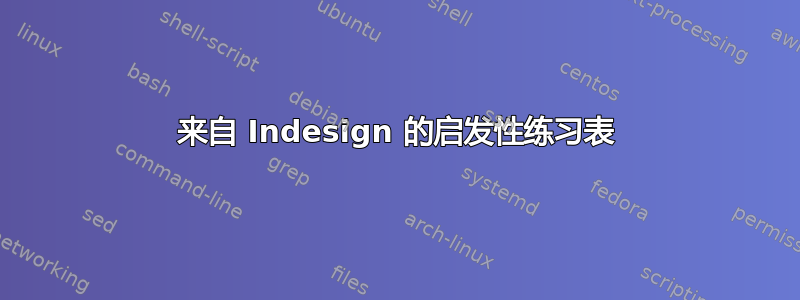
我想创建这张由 Adobe Indesign 制作的表格
有人可以用乳胶制作它吗?
这是我的代码:
\documentclass[12pt,a4paper,twocolumn]{report}
\usepackage[margin=0.5in]{geometry}
\usepackage[french]{babel}
\usepackage{fontspec}
\usepackage{graphicx}
\usepackage{amsthm,amssymb,amsfonts,mathtools}
\usepackage[utf8]{inputenc}
\usepackage{multicol}
\usepackage{multirow}
\usepackage{amssymb}
\usepackage{array}
\usepackage{graphicx}
\setlength{\columnseprule}{0.5pt}
\thispagestyle{empty}
%%%%%%%%%%%%%%%%%%%%%%%%%%%%%%%%%%%%%%%%%%
\begin{document}
%%%%%%%%%%head%%%%%%%%%%%%%%%%%%%%%%%
\twocolumn[
\begin{@twocolumnfalse}
\begin{center}
\fbox{\Large Exercise Sheets}
\end{center}
\hrulefill
\end{@twocolumnfalse}
]
%%%%%%%%%%%%%%%%%%%%%%%%%%%%%%%%%%%%%%%%%%%%%%%%%%%%
\fbox{ Exercise $1$:}\\
Compute the following limits
\begin{multicols}{2}
\begin{enumerate}
\item $\lim_{x\to 2}\dfrac{4x^{3}-5x-22}{x^{2}-x-2}$
\item $\lim_{x\to 0^{+}}\dfrac{x-\sqrt{x}}{x+\sqrt{x}}$
\item $\lim_{x\to 1}\dfrac{\sqrt{x+3}+\sqrt{x}-3}{x-1}$
\item $\lim_{x\to 2}\dfrac{x^{2}\sqrt{x+2}-8}{4-x^{2}}$
\end{enumerate}
\end{multicols}
%%%%%%%%%%%%%%%%%%%%%%%%%%%%%%%%%%%%%%%%%%%%%%%%%%%%%%%%%%%%%%%%%%%%%
\fbox{ Exercise $2$:}\\
Let $n\in\mathbb{N}^{*}$
\begin{enumerate}
\item calculate : ${\displaystyle \lim_{x\to 0}\dfrac{1-\cos(x)\cos(2x)\ldots+\cos(nx)}{x^2} }$
\item b
\item c
\item d
\item e
\item f
\end{enumerate}
%%%%%%%%%%%%%%%%%%%%%%%%%%%%%%%%%%%%%%%%%%%%%%%%%%%%%%%%%%%%%%
\end{document}
答案1
我对答案进行了大幅修改。结果如下。代码中有一些注释可以提供帮助。
使用tikz.sty和eso-pic.sty您可以实现类似的功能,而无需手动拆分文本。这是一个概念验证,我稍后有机会时会添加它。不过,这可能是一个开始。
% !TEX encoding = UTF-8 Unicode
% !TEX TS-program = XeLaTeX
\documentclass{article}
\usepackage{tikz}
\usepackage{multicol}
\usepackage{lipsum}
\usepackage{tikzpagenodes}
\usepackage{eso-pic}
\usepackage{enumitem}
\usepackage{amsmath}
\usepackage{unicode-math}
\usepackage[margin=1in]{geometry}
\setmainfont{STIX Two Text}
\setmathfont{STIX Two Math}
\setsansfont{Helvetica Neue}[Scale=0.9]
\usetikzlibrary{calc}
\usetikzlibrary{shapes.multipart}
\newcounter{exrc}
\newcommand{\exstep}{%
\stepcounter{exrc}%
\tikz[baseline]\node[anchor=base,%
rectangle split,
rectangle split parts=2,
draw=gray,
thick,
rectangle split horizontal,
rectangle split part fill={gray,white},
inner sep=3pt] (exx) at (0,0)
{\textcolor{white}{\bfseries \extype}\nodepart{two}\theexrc};
}
\AddToShipoutPictureBG{%
\begin{tikzpicture}[remember picture,overlay]
\draw[thick,rounded corners]
($(current page text area.south west)+(-12pt,-12pt)$)
rectangle
($(current page text area.north east)+(12pt,12pt)$);
\node[white,fill=gray,rounded corners]
at ($(current page text area.north)+(0,12pt)$)
%% Change `Exercises' to suit
{\bfseries\sffamily\hspace*{1em}Exercises\hspace*{1em}};
\end{tikzpicture}
}
%% There are two environments, `exci` for exercises using `enumerate`,
%% and `exct` for text exercises that do not use `enumerate`.
%% Both have an optional argument to change the name of the
%% exercise on the fly. See the included examples.
\newenvironment{exci}[2][Exercise]{%
\def\extype{#1}%
\leavevmode\exstep\par
\smallskip
#2
\begin{enumerate}[leftmargin=*,noitemsep,nosep]
}{%
\end{enumerate}
\bigskip
\def\extype{Exercise}%
}
\newenvironment{exct}[1][Exercise]{%
\def\extype{#1}%
\leavevmode\exstep\par
\smallskip
}{%
\bigskip
\def\extype{Exercise}%
}
\setlength{\columnseprule}{0.4pt}
\parindent0pt
\begin{document}
\begin{multicols*}{2}
\begin{exci}{Calculate the following limits:}
\item $\lim\displaylimits_{x \to2}\frac{4x^3-5x-22}{x^2-x-2}$
\item $\lim\displaylimits_{\substack{x \to 0\\x > 0}}\frac{x-\sqrt{x}}{x+\sqrt{x}}$
\item $\lim\displaylimits_{x \to 0}\frac{\sqrt{x+3}+\sqrt{x}-3}{x-1}$
\item $\lim\displaylimits_{x \to 2}\frac{x^2\sqrt{x+2}-8}{4-x^2}$
\end{exci}
\begin{exci}{Let $n \in \mathbb{N}^*$}
\item Calculate: $\lim_{x \to 0}\frac{1-\cos(x)\cos(2x)\cdots+\cos(nx)}{x^2}$
\item Calculating as a function of n the following limit: $\lim_{x \to 1}\frac{1+x+x^2+\cdots+x^n-n}{(2-x)^n-1}$
\end{exci}
\begin{exct}
Let $f$ be the continuous function on $[0,+\infty]$ having a finite limit at $+\infty$.
Show that $f$ is bounded.
\end{exct}
\begin{exci}{This is a $E=mc^2$ test of this environment}
\item True
\item False
\end{exci}
\begin{exci}[Extra credit]{This is a $E=mc^2$ test of this environment}
\item True
\item False
\end{exci}
\begin{exct}[Exercise*]
This is yet another one without an enumerate.
\end{exct}
\end{multicols*}
\end{document}
毫无疑问,改进是可能的,而且是受欢迎的。请注意,我已将 STIX 2.0 与 XeLaTeX 和 一起使用unicode-math.sty。
我修正了我在实施格式时遇到的一个问题。
答案2
我认为这种格式的主要问题是你想要在装饰边界框内采用两列格式。
和多列的组合tcolorbox是可能的,但需要满足某些条件。可破坏元素tcolorbox可以在多列中使用,但框会应用于每一列。您也可以multicol在内部使用环境tcolorbox,但前提是框不可破坏。所以,我认为没有简单的解决方案。
但如果您不介意使用非自动解决方案,tcolorbox也可以使用。以下代码显示了基于magazine和raster库的部分非自动解决方案。
magazine库允许将文本拆分并存储在多个框中,以便以后使用。使用此工具,可以将文本拆分为“一列宽 x 固定高度”的片段。
\begin{tcolorbox}[blanker,
width=.4\textwidth, %<-------- column width
breakable,
break at=.93\textheight, %<----- column height
height fixed for=first and middle,
watermark text=\arabic{tcbbreakpart},
reset box array,
store to box array,]
\lipsum[1-7] %<---- Here is the text
\end{tcolorbox}
一旦获得了 fragment 中的所有文本,就可以手动将其组合成breakable可以像其他任何文本一样进行装饰的栅格tcolorbox。在这种情况下,盒装的 tcbitemize 环境可以完成这项工作。
\begin{tcboxeditemize}[
blanker, raster columns=2, sharp corners,
halign=center, raster valign=top] %<--- inner boxes format and distribution
{breakable, colback=yellow!10,
fonttitle=\bfseries,
attach boxed title to top center={yshift*=-\tcboxedtitleheight/2},
title=Exercicies,
overlay={\draw [shorten >=4mm, shorten <=4mm]
(frame.north)--(frame.south);}} %<--- Format for outer box
%--- Raster contents ---%
\tcbitem\consumeboxarray{1} %<---- First column
\tcbitem\consumeboxarray{2} %<---- Second column
\tcbitem\consumeboxarray{3} % ...
\tcbitem\consumeboxarray{4}
\end{tcboxeditemize}
不幸的是,我不知道如何foreach在 a 中使用 a tcbraster,所以我们必须手动\tcbitem\consumebnoxarray{...}在文本中插入尽可能多的行作为片段。
最终结果如下:
如果您知道有多少个片段,倒数第二个片段可能会更短,这样您就会得到更加平衡的最后一页,但这不在本解决方案的范围之内。
此外,代码中省略了练习的内部格式。此代码只是尝试展示一个可能的起点。
获取前一张图像的完整代码是:
\documentclass{article}
\usepackage[most]{tcolorbox}
\usepackage{multicol}
\usepackage{lipsum}
\begin{document}
\begin{tcolorbox}[blanker,
width=.4\textwidth,
breakable,
break at=.93\textheight,
height fixed for=first and middle,
watermark text=\arabic{tcbbreakpart},
reset box array,
store to box array,]
\lipsum[1-7]
\end{tcolorbox}
\begin{tcboxeditemize}[blanker, raster columns=2, sharp corners, halign=center, raster valign=top]{breakable, colback=yellow!10, fonttitle=\bfseries, attach boxed title to top center={yshift*=-\tcboxedtitleheight/2}, title=Exercicies, overlay={\draw [shorten >=4mm, shorten <=4mm] (frame.north)--(frame.south);}}
\tcbitem\consumeboxarray{1}
\tcbitem\consumeboxarray{2}
\tcbitem\consumeboxarray{3}
\tcbitem\consumeboxarray{4}
\end{tcboxeditemize}
\end{document}





